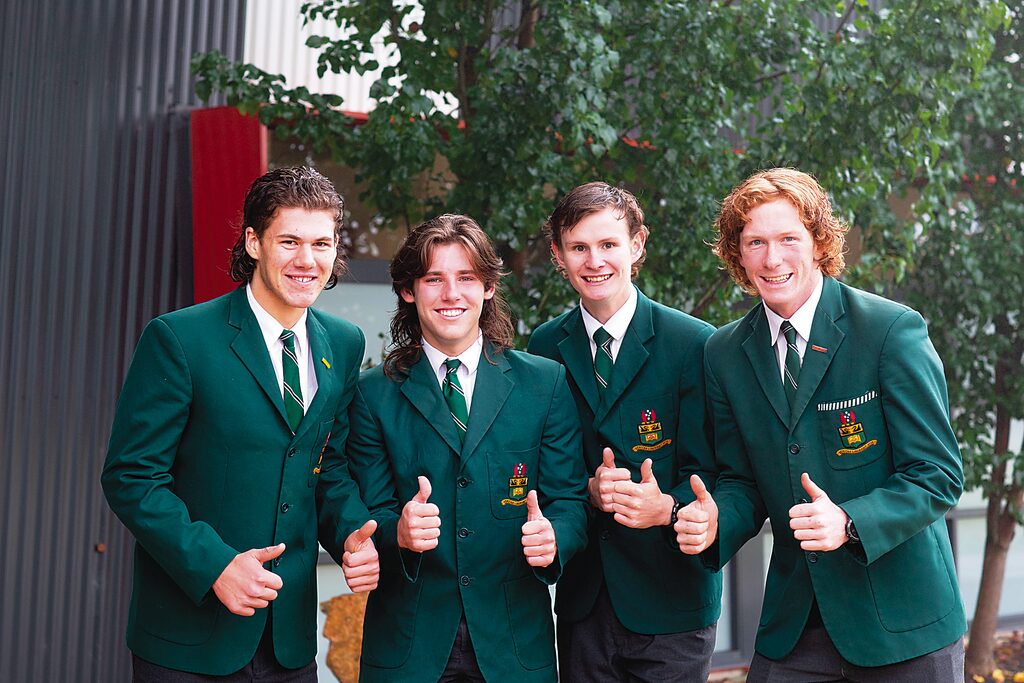Gippsland Grammar wrote the names Anthony Smith, Billy Osborne, Cameron Rule and Lindsay Hamilton in the history books following the school’s most successful Nationals campaign to date.
In April, the four senior school boys won two National titles, and one silver medal at the Australian Rowing Championships held on Lake Nagambie.
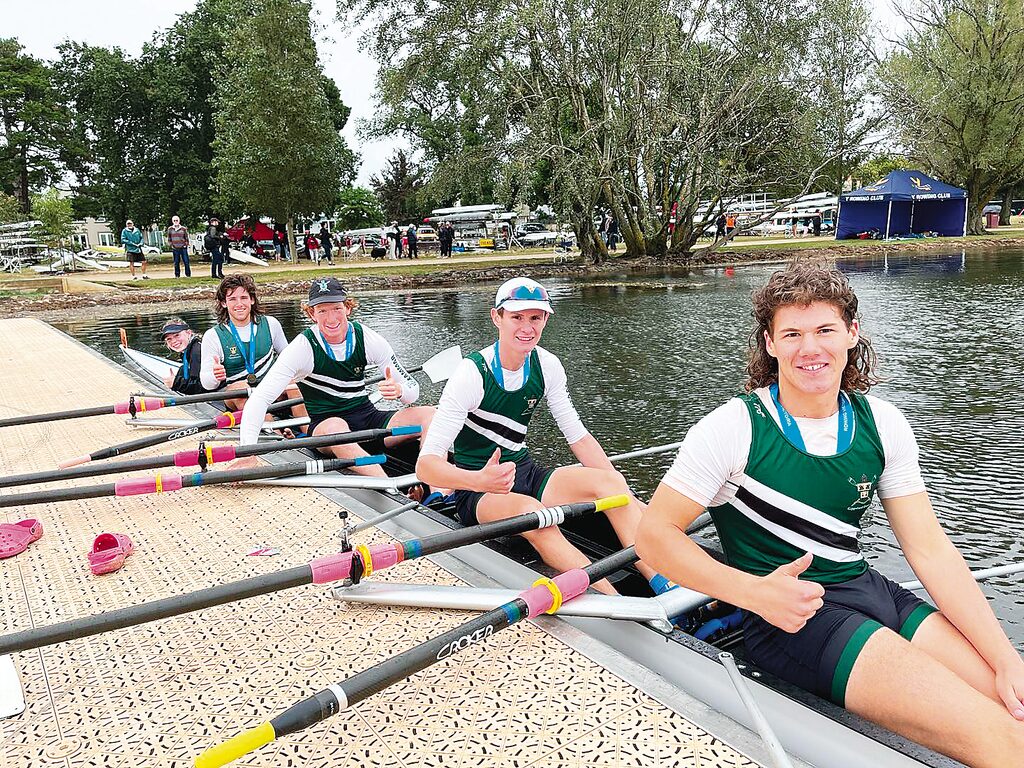
In less than two weeks, Smith, Osborne, Rule and Hamilton will board their boat on the River Thames in Oxfordshire, England and take their place at the starting line in the Men’s Under-19 Coxless Quad Scull at the Henley Royal Regatta; one of the most prestigious regattas in the world.
The Henley Royal Regatta, running from June 28 until July 3, is the highlight of the summer rowing calendar and the social season in the UK.
To race the world-class event in Aussie style, Smith, Osborne, Rule, and Hamilton have grown out their luscious locks to ensure the best foundation for their pre-race mullet cuts.
Following the Henley Royal Regatta, Year 12 students Billy Osborne and Lindsay Hamilton continue to make Gippsland Grammar history as they represent Australia in the under-19 Men’s Quad Scull at the Rowing World Championships in Italy in July.
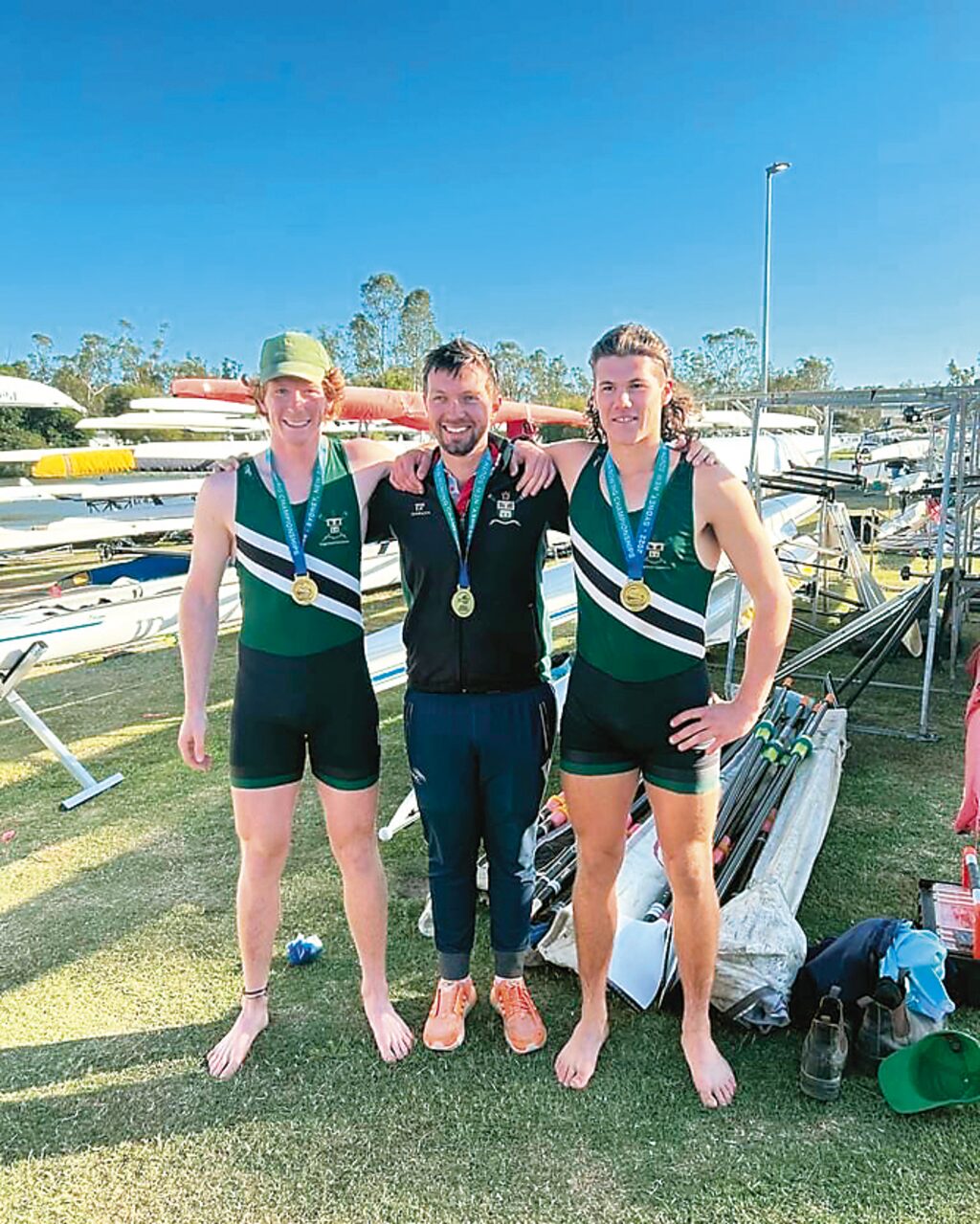
Gippsland Grammar harbours the only rowing team east of Melbourne, which sparks the question of how, in a region dominated by football and netball, did Smith, Osborne, Rule and Hamilton discover rowing? What does it take to win a national rowing title? A quick tip: eating at least three breakfasts and drinking litres upon litres of milk. Who is the person behind the oar and underneath that mullet of hair? And at the age of 17 and 18, with futures abundant in opportunities, what is next for the champion rowers?
Anthony Smith
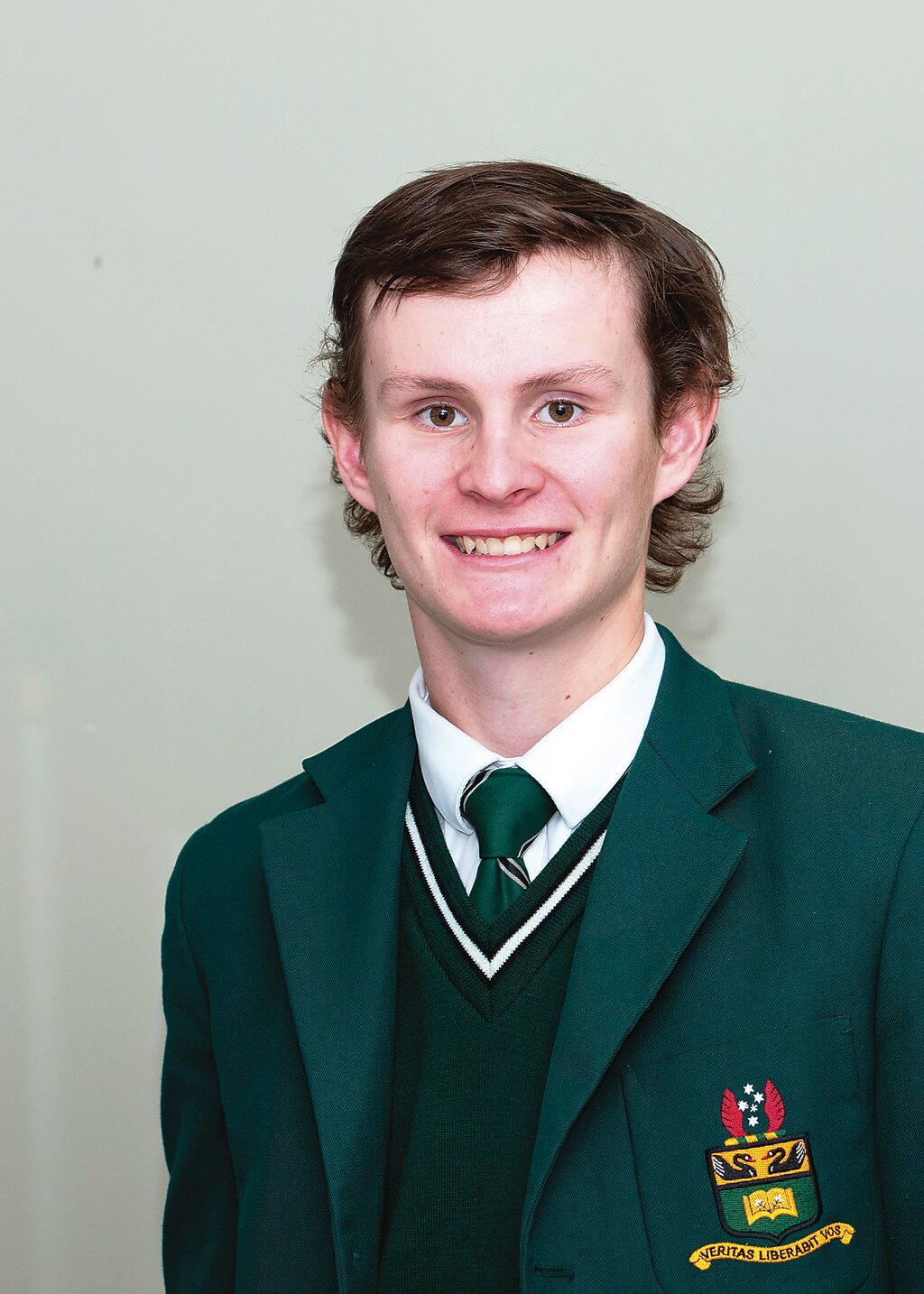
YEAR 11 student Smith is the youngest of the four. Smith was unfamiliar with the sport of rowing until he participated in a learn-to-row program in his Year 7 PE class. During the program, Smith discovered that he thoroughly enjoyed rowing and decided to continue the sport. Unbeknown to Smith, his decision to take up rowing because he thought it was “fun” would earn him a national title and a ticket to the UK, where he would race in the Aussie colours, in just four short years.
Q: What does a day look like in the life of a national-title winning rower?
A: Hard! Normally, at the moment, it’ll be a gym session in the morning, school throughout the day, of course, training at lunch or training after school. If I am not at training after school, I am working. I work at Geddes Butcher.
Q: What are some of the biggest sacrifices you have made to get to where you are today?
A: You don’t have to sacrifice things; you just have to manage your time well, which I struggled with quite a lot until recently. Once you manage your time well, you really don’t have to sacrifice anything.
Q: What is the best thing about rowing?
A: I’d definitely say it’s the mateship throughout the boat, and there is just this feel. I love the feeling of pushing myself just to win. That’s how you win; you have to go harder than the other people there.
Q: What is the worst thing about rowing?
A: Probably the blisters and at the moment the cold morning starts. They’re horrible.
Q: With only a short time left at school, you’ll soon be embarking on a new future. Have you got any plans or goals, and is rowing in that future?
A: I would like to keep going with rowing, but I am not sure if I am quite quick enough; but we will see where that goes. I will keep training, and the goal is to go to uni, and I will look at either rowing for a club or a uni down in Melbourne while I am studying.
Q: What do you want to study at university?
A: I have no idea.
Q: As one of Gippsland Grammar’s four most accomplished rowers in the school’s history and one of the best junior rowers in Australia, what would your advice to young rowers be?
A: Stick with it. One of our old coaches said anytime you want to give up or quit because it’s too hard, just remember why you are doing it in the first place.
Q: With only a few days left before you board the plane at Tullamarine Airport and fly halfway around the world to compete in the Men’s Under-19 Coxless Quad Scull at the Henley Royal Regatta, how are you feeling?
A: I have been overseas before but have never been to the UK. So I am excited, it’s going to be lots of fun, something new. But I am quite nervous just because I care so much about the Quad and how we are going to go. I just hope we do really, really well.
Lindsay Hamilton
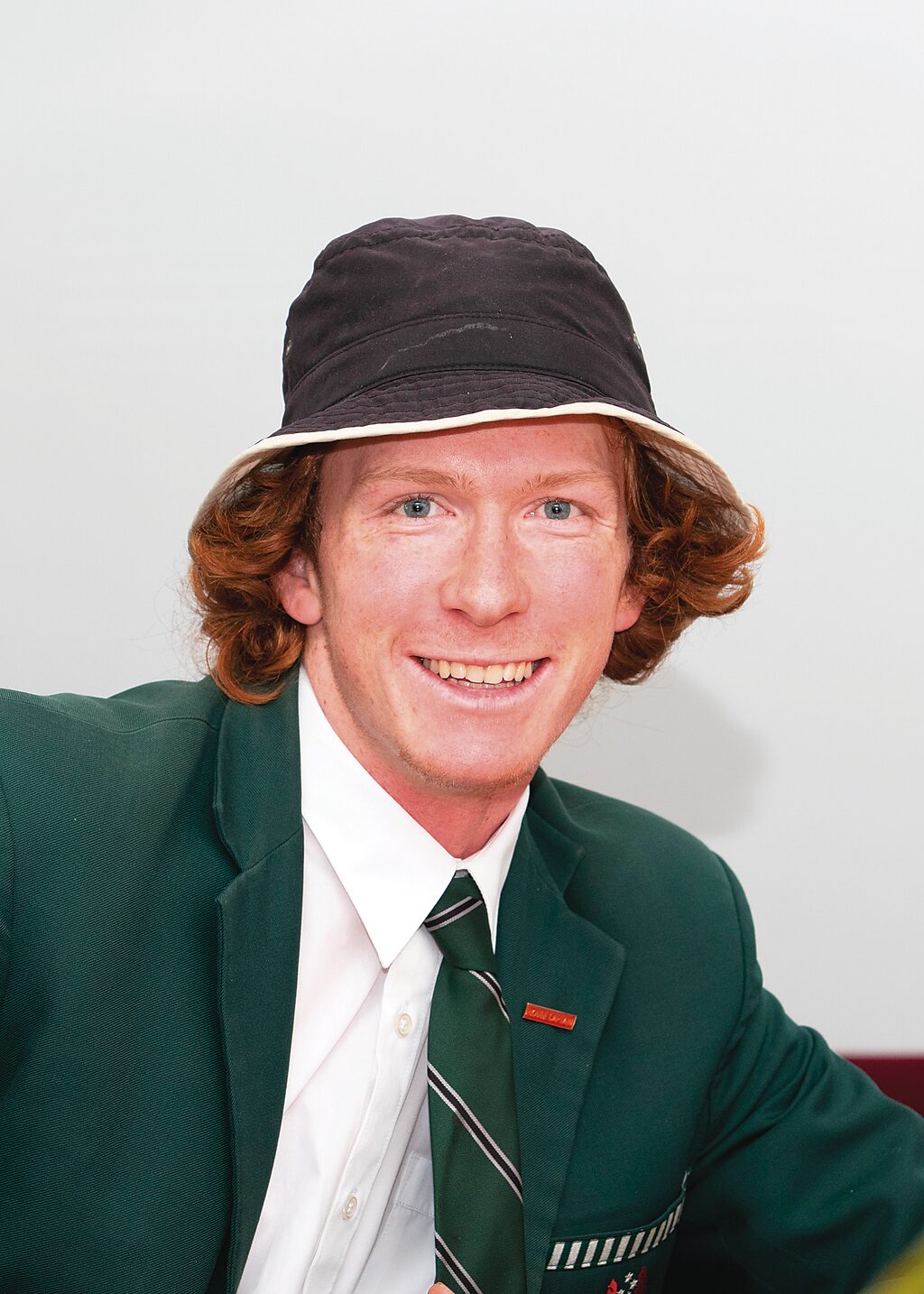
When Lindsay Hamilton was just a young boy, his father would join his crew every Saturday morning to row in Bairnsdale.
“I would be stuck at home with mum, and I didn’t really like that, so I started to go with dad,” Hamilton said.
Before Hamilton was 10 years old, he was coxing with his father’s crew, switching to rowing when he grew too big.
Hamilton certainly has come a long way from rowing with his father’s crew in Bairnsdale on a Saturday morning to representing Australia in the Under-19 Men’s Quad Scull at the World Championships.
Q: What does a day look like in the life of a national-title winning rower?
A: We got training in the mornings on Monday, Wednesday, Friday and Saturday. I live a bit further away than the other boys, so I am getting up around 4.30am so we can get to Sale at 6am, leaving home at 5am. Train after school, so get home pretty late cause training finishes at 6pm, and it takes an hour to drive home. On the weekends, I am working on the farm with dad.
Q: That must be tiring?
A: It’s not too bad, it’s pretty good, cause like, it’s all in a schedule, so you know what you’re doing.
Q: What are some of the biggest sacrifices you have made to get to where you are today?
A: Nick [Bartlett, Gippsland Grammar’s Head of Rowing] is a pretty good bloke.
You can ask him to have a day off, and he will let you have a day off. He just makes you make up those kilometres the next day or the next week. But we have definitely missed out on some parties and seeing mates at times.
I’ll miss out on my mate’s 18th cause we’ll be away at Regattas, so I can’t go, and I got a family holiday I am missing out on. My whole family is going to Darwin when we go to Europe, but you know, it’s probably a better holiday going overseas anyway.
Q: What is the best thing about rowing?
A: The environment, you get to meet so many people. Like so many people, and they are all nice to you, you make really good mates.
Q: What is the worst thing about rowing?
A: The cold mornings, getting on the water at 6am, it’s freezing. The blisters are pretty bad too.
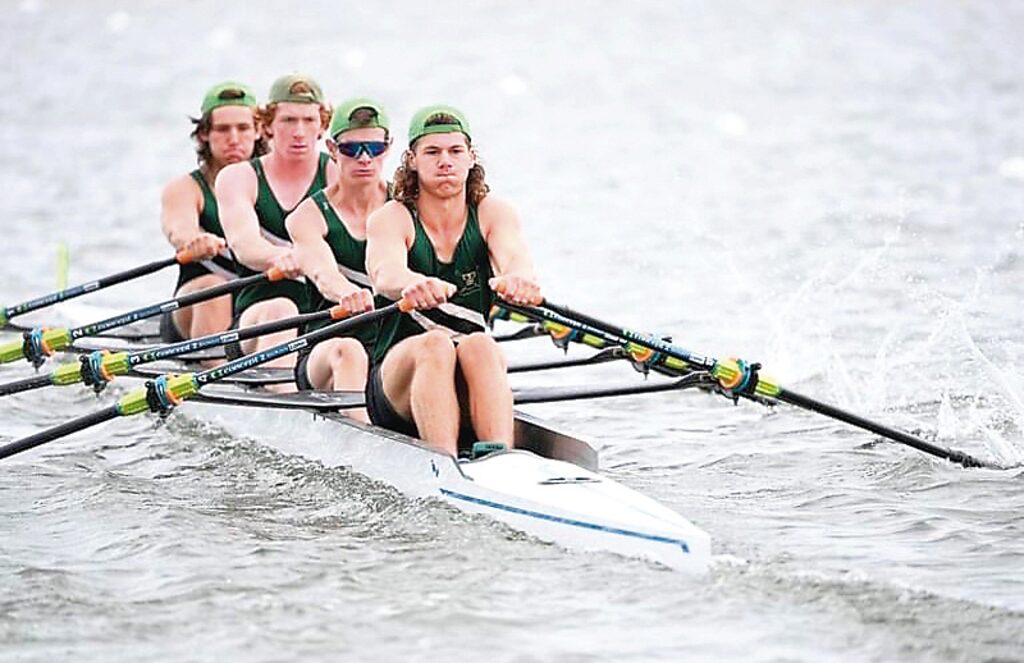
Q: With only a short time left at school, you’ll soon be embarking on a new future. Have you got any plans or goals, and is rowing in that future?
A: My future … the family farm probably. I might go to uni and try to study Agri-business or something, just so I know what to do.
I definitely am going to take a gap year next year and not go straight into rowing.
I don’t really know, I might continue rowing, we’ll see how we go. If we do alright at worlds, I will definitely stick with it.
Q: So there are no sights set on the Olympics?
A: It would be a bloody good achievement if we could, but I don’t know, not really.
Q: As one of Gippsland Grammar’s four most accomplished rowers in the school’s history and one of the best junior rowers in Australia, what would your advice to young rowers be?
A: Just give it a crack cause at the end of the day, it seems like a lot, but when you get off the water, and the session is over, it’s not that big of a deal. Like it’s not that much of an effort you have to put in to have fun and go places.
Q: With only a few days left before you board the plane at Tullamarine Airport and fly halfway around the world to compete in the Men’s Under-19 Coxless Quad Scull at the Henley Royal Regatta, then at the World Championships in Italy, how are you feeling?
A: I’m pretty nervous. It’s the first time I am going overseas, and I feel like there’s a bit of expectation for us to do pretty good. Like a lot of people have got behind us, so I’m just scared that I’ll let them down, but I reckon we’ll come away alright.
Cameron Rule
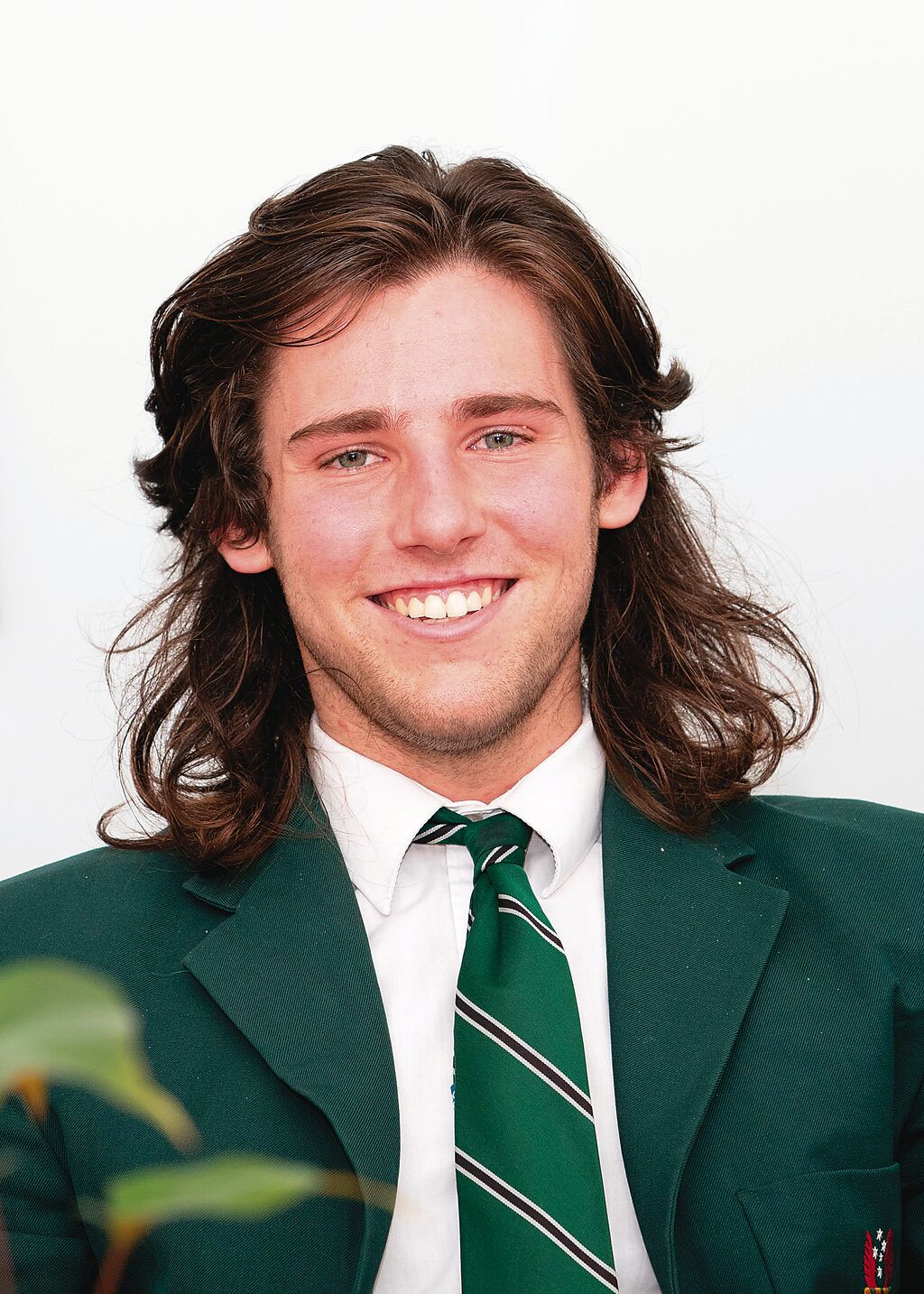
The young man, arguably with the shiniest, most well cared for mullet in the Wellington Shire, Cameron Rule.
Like teammate Anthony Smith, Rule’s first exposure to the sport was in Year 7 in the learn-to-row program.
After the program, Rule received a letter from Peter Campbell, Gippsland Grammar’s previous Head of Rowing.
“I got this letter being like, do you wanna row?” Rule explained colourfully.
“I was like huh, seems like a good idea.”
Six years later, Rule is a National title rowing champion and is packing his bags to race the Men’s Under 19 Coxless Quad Scull at one of the world’s most prestigious and famous regattas.
Q: What does a day look like in the life of a National-title winning rower?
A: Wake up, get ready and go to rowing. Then prepare yourself for the afternoon session. Then go do that, then go home. That’s pretty much it, it’s just rowing mostly.
Q: What are some of the biggest sacrifices you have made to get to where you are today?
A: I’d probably say social life has taken a little bit of a hit, not being able to go to stuff all the time, being at regattas. That sort of has an impact overall, but it’s not really the end of the world; the fact that you are rowing makes up for it.
Q: What is the best thing about rowing?
A: The fact that if you have the right mindset and the right attitude towards it, it’ll pay back your dividends. It will reward you essentially. If you put in the effort, you’ll get something back.
Q: What is the worst thing about rowing?
A: Seeing yourself going not quite fast enough is a really hard thing and sometimes I struggle with not being part of certain teams. Like not making it into certain teams and not getting that opportunity to row, just cause I wasn’t fast enough and obviously that hurts a little bit. But, you know, you just have to keep going through it and train harder.
Q: With only a short time left at school, you’ll soon be embarking on a new future. Have you got any plans or goals, and is rowing in that future?
A: At the moment, I am probably going to take a year off. Just from everything and relax for a bit. I won’t take a year off rowing though; I’ll probably come back after a month off or something.
I was thinking of continuing to row for a university or for a club. Or maybe I’ll take up cycling and see how that goes, who knows.
But yeah, I will probably go to university to study cyber security cause it is quite well funded by the government, and it’s needed, and it pays well.
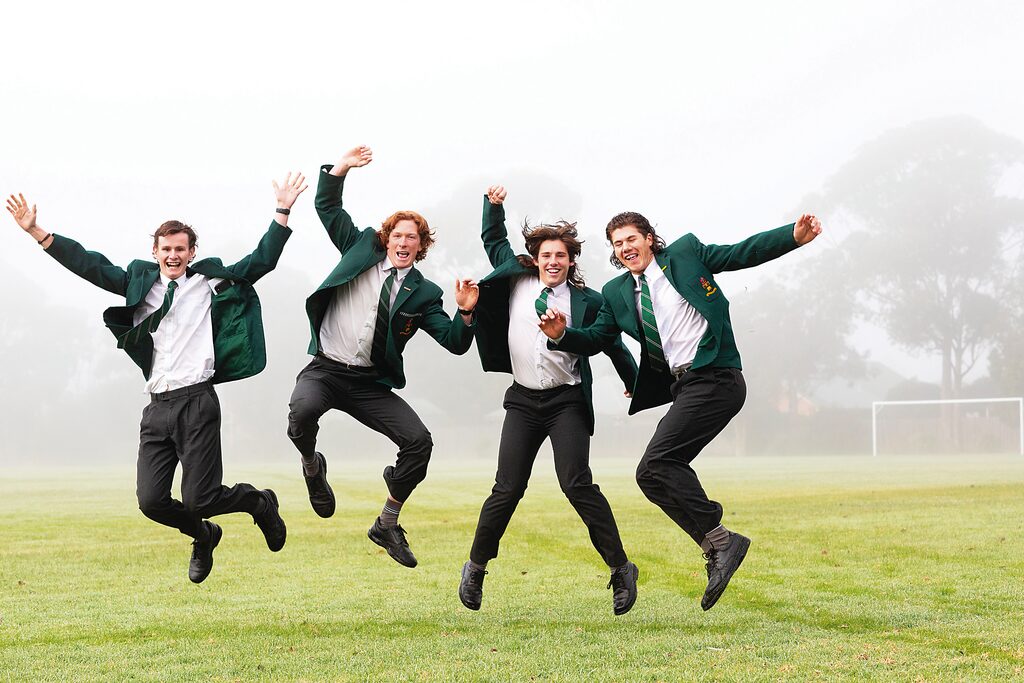
Q: As one of Gippsland Grammar’s four most accomplished rowers in the school’s history and one of the best junior rowers in Australia, what would your advice to young rowers be?
A: It would definitely be to push yourself. Certainly, take inspiration from older people who have done it for a lot longer than you.
You really need to have the mindset to do it. Once you’ve found that mindset, you’ll be sorted for life because that mindset basically applies to everything else; it applies to life, schooling, jobs.
“Once you have that, you want it – you gotta go get it mindset, you’ll be able to do anything.”
Q: With only a few days left before you board the plane at Tullamarine Airport and fly halfway around the world to compete in the Men’s Under-19 Coxless Quad Scull at the Henley Royal Regatta, how are you feeling?
A: Obviously, I am nervous about racing overseas, it’s quite a big step up, especially since we are the only Australian Quad coming to Henley, so that will be quite interesting.
I am a bit sad I couldn’t make it into the Australian World Championships team or try out for that, but it’s not the end of the world; I can do it next year and the year after, so I just gotta keep training.
Billy Osborne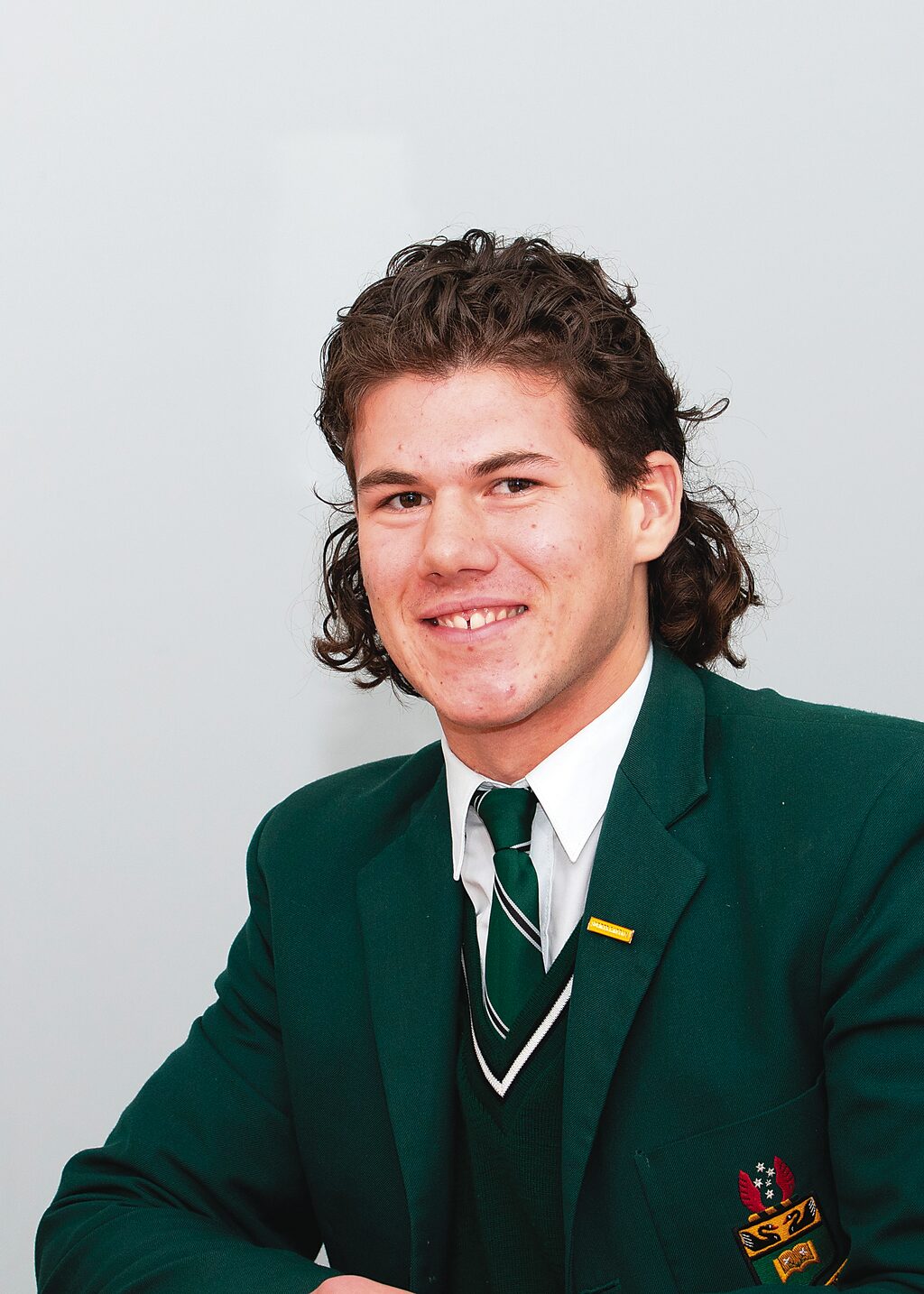
Billy Osborne. In Year 7, Billy Osborne participated in the learn-to-row program facilitated by Gippsland Grammar.
While the program helped Osborne discover an enjoyment for rowing, it was a small group of people he spoke with during the program that he credits for his continuation in the sport.
“I decided to continue in Year 8 after I saw some people in the rowing program who said they really enjoyed it and liked what it brought to them,” Osborne said.
After countless early morning starts, red-raw blisters, blood, sweat and tears, Osborne heads to Italy with teammate Hamilton to represent Australia in the Under-19 Men’s Quad Scull.
Q: What does a day look like in the life of a national-title winning rower?
A: Normally, I start with a morning session, starting around 6 or 7am. Then we would go to school, and we normally have two sessions a day, so the second session would either be at lunchtime or after school. Then I get home, do my homework, eat dinner, and sleep.
Q: What are some of the biggest sacrifices you have made to get to where you are today?
A: There definitely have been sacrifices. Sometimes you’ve got to give up stuff or minimise stuff to perform at your best, but I definitely think it’s brought more to our experiences at school and in your lives than it has taken away. Definitely have learned how to manage it all well. It compliments you and helps you develop as a person more rather than just having it easy all the time. So yeah, rowing has definitely brought more to us than it has taken away.
Q: What is the best thing about rowing?
A: It just really helps shape you as a person. It teaches you how to try hard. It teaches you how to stick at something even though it’s not always easy. Creates good mates, and it’s definitely something that when you put your mind to it is an equal reward kind of sport, you know. You get out what you put in.
“It’s something that if you stick at it, you can definitely see the rewards.”
Q: What is the worst thing about rowing?
A: Um, it’s probably the, it puts a lot of pressure on you. Like it is a lot at times, but I suppose there is nothing really that bad about it. I guess the more serious the competition increases, the more you put yourself under pressure and then having to juggle that with school; it is a lot of stuff. But really, in the long term, that’s not at all a negative because you learn to deal with it.
Q: With only a short time left at school, you’ll soon be embarking on a new future. Have you got any plans or goals, and is rowing in that future?
A: I’m going to find a uni somewhere and row; I am not going to take a gap year. I’ll train locally until uni starts and then go over, wherever that is, row and study. I will probably study for an agriculture degree.
Q: As one of Gippsland Grammar’s four most accomplished rowers in the school’s history and one of the best junior rowers in Australia, what would your advice to young rowers be?
A: Get a big goal; you can’t aim low. You gotta believe in yourself and just do what you can every day, small steps. You might not always feel like you’re achieving because you aren’t seeing results, but every little thing you do helps you. But really, just believe in yourself because it can happen.
Q: With only a few days left before you board the plane at Tullamarine Airport and fly halfway around the world to compete in the Men’s Under-19 Coxless Quad Scull at the Henley Royal Regatta, how are you feeling?
A: It will be a great experience. What I am looking forward to the most is just meeting new people and experiencing new stuff that doesn’t happen in Australia.
I know it’s going to be different, I don’t know how it is going to be different, but I know it’s going to be different.
It really will be an experience, and I am just looking forward to seeing how people live over there, how different people row, how they juggle everything, just all the differences.
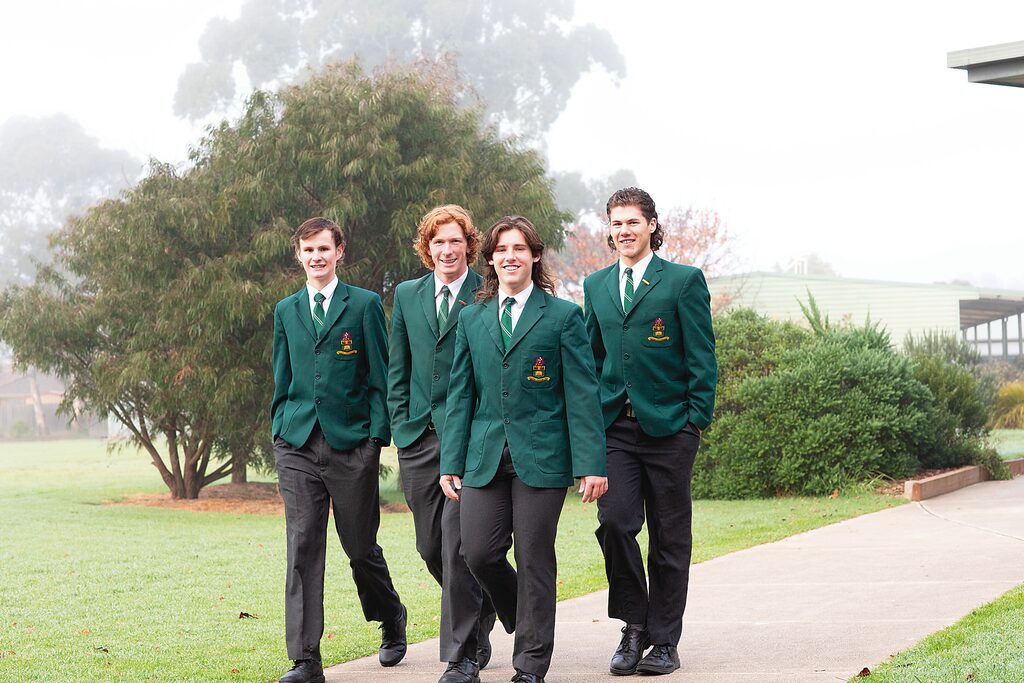
Following their interview with the Gippsland Times, the Grammar rowing champs left with just one request, “can you please include a thank you to mum and dad.”
“We just want to thank them; for the early morning lifts, their ongoing support, for everything.”
Gippsland Grammar’s head of rowing Nick Bartlett has coached the boys for the past two years and is incredibly proud of their achievements.
“It’s them; All the credit goes to them because this is what they want to do and what they want to achieve. All my job is, is to facilitate that,” Bartlett said.
“They really deserve the credit for getting where they have got to.”
Bartlett, who has also been selected as the coach for the Under-19 Men’s Quad Scull team at the World Championships in Italy, has made a lasting impression with the boys, receiving nothing, but praise.
“He’s a pretty good bloke. He’s better than other coaches too, if there’s a gym session, he’ll just jump in and be like, aw yeah I can do that and just start doing it with you,” Hamilton said.
“Or like we were racing an eight one day and one of the blokes didn’t rock up, so Nick just jumped in the stroke seat and was like yeah righto.”
“Nick’s great. He takes us like more than just his job; he is really invested in us and sacrifices just as much as we do, if not more,” Osborne added.
“He is always there to help us in any way we need. He’s just really invested, which pushes us on to do more because he is someone we want to do really well for. Having him as a coach is really good.”

